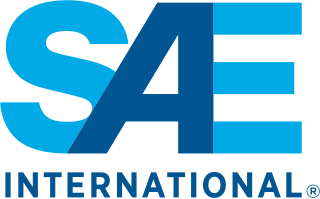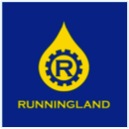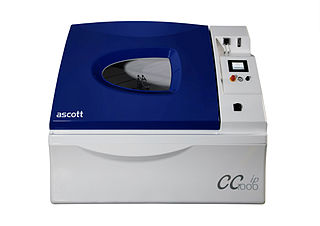A lubricant is a substance that helps to reduce friction between surfaces in mutual contact, which ultimately reduces the heat generated when the surfaces move. It may also have the function of transmitting forces, transporting foreign particles, or heating or cooling the surfaces. The property of reducing friction is known as lubricity.

The American Iron and Steel Institute (AISI) is a trade association of North American steel producers. Including its predecessor organizations, it is one of the oldest trade associations in the United States, dating back to 1855. It assumed its present form in 1908, with Judge Elbert H. Gary, chairman of the United States Steel Corporation, as its first president. Its development was in response to the need for a cooperative agency in the iron and steel industry for collecting and disseminating statistics and information, carrying on investigations, providing a forum for the discussion of problems and generally advancing the interests of the industry.

Motor oil, engine oil, or engine lubricant is any one of various substances used for the lubrication of internal combustion engines. They typically consist of base oils enhanced with various additives, particularly antiwear additives, detergents, dispersants, and, for multi-grade oils, viscosity index improvers. The main function of motor oil is to reduce friction and wear on moving parts and to clean the engine from sludge and varnish (detergents). It also neutralizes acids that originate from fuel and from oxidation of the lubricant (detergents), improves the sealing of piston rings, and cools the engine by carrying heat away from moving parts.

A hydraulic fluid or hydraulic liquid is the medium by which power is transferred in hydraulic machinery. Common hydraulic fluids are based on mineral oil or water. Examples of equipment that might use hydraulic fluids are excavators and backhoes, hydraulic brakes, power steering systems, automatic transmissions, garbage trucks, aircraft flight control systems, lifts, and industrial machinery.

SAE International is a global professional association and standards organization based in Warrendale, Pennsylvania, United States. Formerly the Society of Automotive Engineers, the organization adopted its current name in 2006 to reflect both its international membership and the increased scope of its activities beyond automotive engineering and the automotive industry to include aerospace and other transport industries, as well as commercial vehicles including autonomous vehicles such as self-driving cars, trucks, surface vessels, drones, and related technologies.

Synthetic oil is a lubricant consisting of chemical compounds that are artificially modified or synthesised. Synthetic lubricants can be manufactured using chemically modified petroleum components rather than whole crude oil, but can also be synthesized from other raw materials. The base material, however, is still overwhelmingly crude oil that is distilled and then modified physically and chemically. The actual synthesis process and composition of additives is generally a commercial trade secret and will vary among producers.
The NLGI consistency number expresses a measure of the relative hardness of a grease used for lubrication, as specified by the standard classification of lubricating grease established by the National Lubricating Grease Institute (NLGI). Reproduced in standards ASTM D4950(“standard classification and specification of automotive service greases”) and SAE J310(“automotive lubricating greases”), NLGI's classification is widely used. The NLGI consistency number is also a component of the code specified in standard ISO 6743-9“lubricants, industrial oils and related products — classification — part 9: family X (greases)”.
Timken OK Load is a standardized measurement that indicates the possible performance of extreme pressure (EP) additives in a lubricating grease or oil. The units of measurement are pounds-force or kilograms-force. This measurement is performed using a special test machine and standard block and ring test specimens.

ASTM International, formerly known as American Society for Testing and Materials, is a standards organization that develops and publishes voluntary consensus technical international standards for a wide range of materials, products, systems and services. Some 12,575 apply globally. The headquarters is in West Conshohocken, Pennsylvania, about 5 mi (8.0 km) northwest of Philadelphia. It was founded in 1902 as the American Section of the International Association for Testing Materials.

Gear oil is a lubricant made specifically for transmissions, transfer cases, and differentials in automobiles, trucks, and other machinery. It has high viscosity and usually contains organosulfur compounds. Some modern automatic transaxles do not use a heavy oil at all but lubricate with the lower viscosity hydraulic fluid, which is available at pressure within the automatic transmission. Gear oils account for about 20% of the lubricant market.
Grease is a solid or semisolid lubricant formed as a dispersion of thickening agents in a liquid lubricant. Grease generally consists of a soap emulsified with mineral or vegetable oil.

Lithium soap is a soap consisting of a lithium salt of a fatty acid. Sodium-based and potassium-based soaps are used as cleaning agents in domestic and industrial applications, whereas lithium soaps are used as components of lithium grease.

Lincoln Industrial Corporation (Lincoln) is a manufacturer of automated lubrication systems, manual lubrication equipment and industrial pumping systems, and subsidiary of Svenska Kullagerfabriken AB (SKF). Founded in 1910, the company has been responsible for many of the inventions that established modern lubrication practices in automotive maintenance and industry.

Aerospace bearings are the bearings installed in aircraft and aerospace systems including commercial, private, military, or space applications.

Automatic lubrication systems (ALS), also known as centralized lubrication systems (CLS), are mechanical devices designed to dispense precise quantities of lubricant to multiple points within machinery during operation. While typically fully automated, some systems may require manual activation via pumps or buttons and still fall under the centralized lubrication category.
Oilite is a brand of self-lubricating bearing that is made from metal alloys with pores that channel lubricants between the bearing itself and the shaft. It is manufactured from different types of material. Traditional Oilite is mostly made of copper with approximately 10% tin and up to 1% iron, while both Super Oilite and Super Oilite 16 are primarily made of iron with about 20% copper and, in the case of the latter, up to 1% graphite. Oilite is currently a registered trademark of Beemer Precision, Inc.

The Petromin Corporation is a Saudi Arabian lubricants and automotive services company, operating in lubricant oils including manufacturer, industrial, and automotive oils and lubricants, car servicing, fuel retailing and car dealerships. The company is one of the "Major Leading Players" of the lubricating grease Industry.

Founded in 2009, "Runningland Metrology & Testing (Shanghai) Co., Ltd" is a Shanghai-based accredited third party laboratory that specializes in instruments metering, condition monitoring, calibration and testing petrochemical products. The company was founded by David Zhou, who is an active member of STLE ASTM D2 Committee, and SAE, and co-founded by Ti Zhou who is a member of Shanghai Lubrication Trade Association. As a commercial third party laboratory, the organization also collaborates with educational institutions and research associations across China. Oil analysis is still a relatively developing idea and has become an increasingly important concept in The People's Republic of China. Because the oil analysis market in China is growing, Runningland has developed a lab that specializes in grease testing. In 2015, STLE has published a report indicating its previous activities and plans to expand into the China market by organizing the China Advisory Council, which consists of 15 prominent members of China's lubrication industry including David Zhou, Chairman and Co-founder of Runningland.

Cyclic Corrosion Testing (CCT) has evolved in recent years, largely within the automotive industry, as a way of accelerating real-world corrosion failures, under laboratory controlled conditions. As the name implies, the test comprises different climates which are cycled automatically so the samples under test undergo the same sort of changing environment that would be encountered in the natural world. The intention being to bring about the type of failure that might occur naturally, but more quickly i.e. accelerated. By doing this manufacturers and suppliers can predict, more accurately, the service life expectancy of their products.

SAE J300 is a standard that defines the viscometric properties of mono- and multigrade engine oils, maintained by SAE International. Key parameters for engine oil viscometrics are the oil's kinematic viscosity, its high temperature-high shear viscosity measured by the tapered bearing simulator, and low temperature properties measured by the cold-cranking simulator and mini-rotary viscometer. This standard is commonly used throughout the world, and standards organizations that do so include API and ILSAC, and ACEA.















